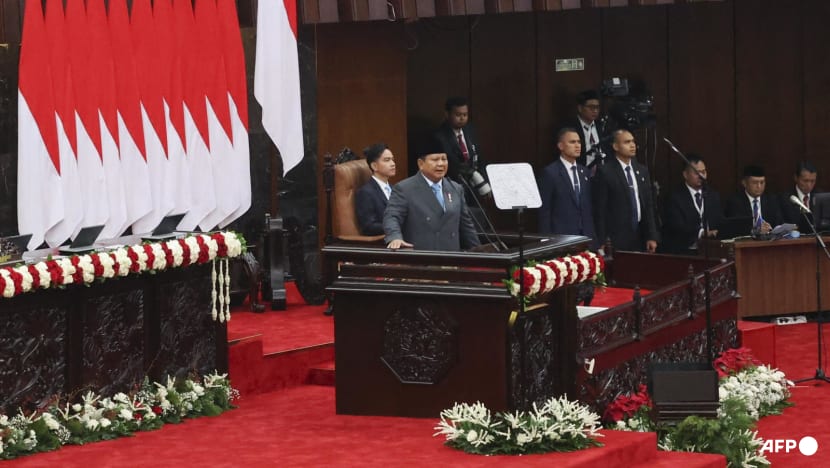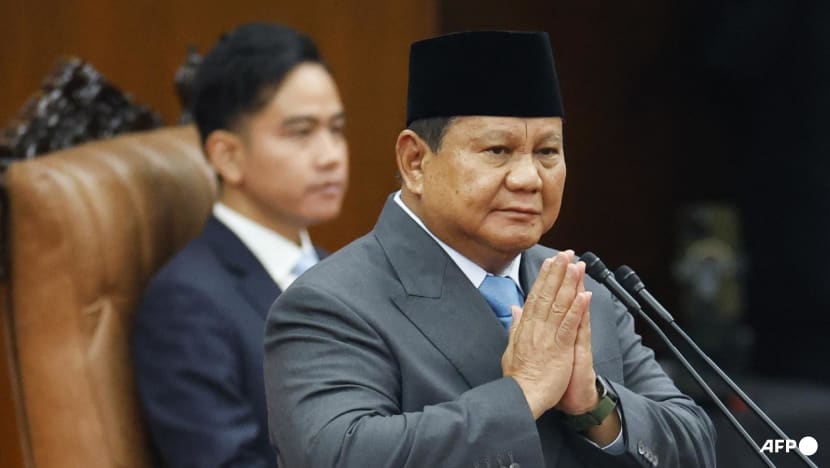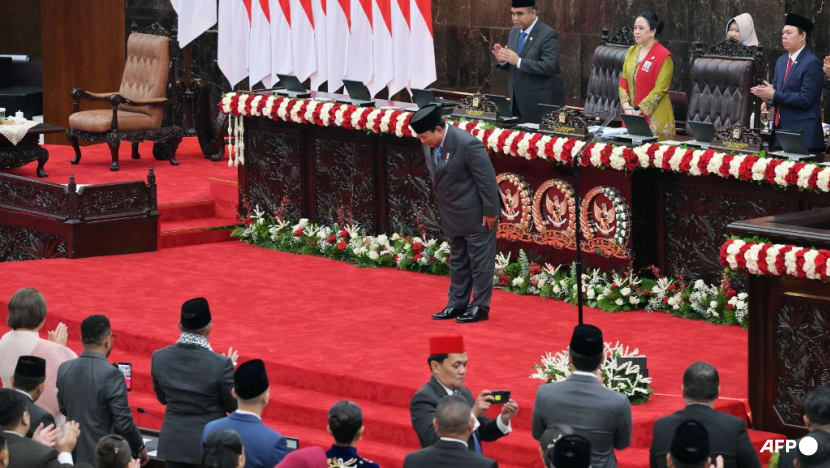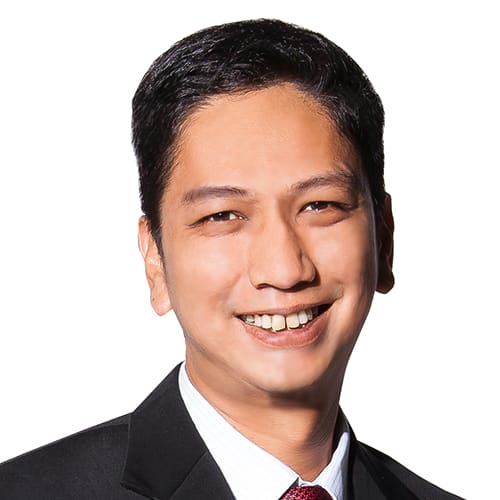Prabowo vows crackdown on ‘greednomics’, corruption in first State of the Nation address
In a separate speech on Friday (Aug 15) he outlined a 2026 government budget of 3,786.5 trillion rupiah (US$234.4 billion), with a deficit forecast at 2.48 per cent of gross domestic product.

Indonesian President Prabowo Subianto delivers his State of the Nation address on Aug 15, 2025. (Photo: AFP/Ajeng Dinar Ulfiana)

This audio is generated by an AI tool.
JAKARTA: Indonesia will crack down on exploitative business practices or “greednomics”, said President Prabowo Subianto on Friday (Aug 15) in his first State of the Nation address where he also highlighted his government’s achievements since taking office last October.
Speaking at the parliament complex in Jakarta, Prabowo said his government will not tolerate corporations that maintain monopolies, engage in price-fixing, hoard subsidised goods for resale at a profit, or deliberately create shortages to manipulate market prices.
“There are businessmen who use their wealth … to cheat and sacrifice Indonesian people’s interests to maximise profit. This for us is unacceptable,” the president said, vowing to punish businesses and individuals who engage in practices he described as “serakahnomics” or “greednomics”.
“The government that I lead will look out for cases of cheating, manipulation, fraud, hoarding and price fixing… The government that I lead will not hesitate to defend the interest of the people of Indonesia.”
Curbing these “greednomics” practices is one of the reasons Prabowo said he has set up more than 80,000 village cooperatives across Indonesia, to make sure subsidised goods are not controlled by middle men but instead directly benefit farmers.
The cooperatives, he added, will also ensure that farmers receive the best price for their produce.
“There are still way too many starving farmers and fishermen who struggle to sell their crops,” he said.
“We channel fertiliser from the factories straight to the farmers. We provide farmers with (free) agricultural equipment. Today, I noticed everywhere I went, the farmers were smiling because we buy (produce from them) at stable prices and increase their earnings.”
In a separate speech in parliament on Friday afternoon, Prabowo outlined a 2026 government budget of 3,786.5 trillion rupiah (US$234.4 billion), with a deficit forecast at 2.48 per cent of gross domestic product (GDP).
He said the government will try to gradually reduce the gap and balance the annual budget within three years.

ROOTING OUT CORRUPTION
In his State of the Union address, Prabowo also promised to root out corruption, which he said is rampant “at every level of bureaucracy”.
He said that the government has saved about 300 trillion rupiah by slashing “expenses which are prone to corruption and manipulation”, including unnecessary overseas junkets, excessive meetings and other non-essential expenditures.
“We will not hesitate in unravelling major corruption cases,” he said.
The president also promised to clamp down on illegal mining, which he said is costing the state billions of dollars, as well as on the smuggling of cheap goods from overseas which threatens local producers.
He also pledged to take actions against officials who are protecting or turning a blind eye on these operations.
Speaking to CNA, Bhima Yudhistira, executive director of Center for Economic and Legal Studies (CELIOS), agreed that the illegal activities and unethical practices Prabowo described as "greednomics" are costing Indonesia billions of dollars.
But Bhima said that cracking down on them would take years of effort.
Kunto Adi Wibowo, a political expert from Padjadjaran University, meanwhile took issue with how Prabowo spoke about “greednomics” and corruption.
"In a nutshell, Prabowo's speech appeared to be saying that if the economy is not doing so well, if people are suffering, then it is the doing of these heartless businesses and corrupt officials and not the result of government missteps and mismanagement," he told CNA.
"He must prove that he is indeed serious about cracking down these practices. Otherwise, he is simply shifting the blame for the economic woes affecting people."
HIGHLIGHTING ACHIEVEMENTS
Another key plank of Prabowo’s State of the Union address was his free nutritious meal initiative, which he presented as a cornerstone of his efforts to alleviate poverty and “create a generation which is healthy, smart and productive”.
Launched in early January, the programme has now reached more than 82 million schoolchildren and pregnant women, the president said. He touted the pace of its rollout, saying his government had achieved in seven months what “other countries take years to accomplish”.
In his speech lasting just over an hour ahead of the country’s 80th Independence Day on Sunday, Prabowo also highlighted his government’s efforts to provide free health check ups to millions of Indonesians as well as free boarding schools to children from low-income families.
The president linked these efforts to his long-term “Golden Indonesia 2045” vision, which calls for sustained economic growth and improved human development indicators.
But some experts have raised concerns about these programmes’ hefty price tags and their effects on Indonesia’s economy.
On Jul 1, the Finance Ministry predicted all of these programmes would cause a government deficit of around US$40 billion, or 2.7 per cent of the country’s gross domestic product by the end of 2025.
The president believed that his administration could address the deficit by boosting revenue and stamp out corruption and wasteful spending.
One way is through the newly-established sovereign wealth fund Daya Anagata Nusantara (Danantara) mobilising up to US$900 billion in state assets for investment.
He also mentioned the various economic opportunities created through a number of diplomatic ties he had forged this year such as the planned comprehensive economic partnership agreement between Indonesia and the European Union which is now in its finalisation stage.
Friday’s State of the Nation address was attended by the country's former presidents Susilo Bambang Yudhoyono and Joko “Jokowi” Widodo, as well as speakers of parliament from neighbouring countries including Singapore’s Seah Kian Peng and Malaysia’s Johari Abdul and other dignitaries.

2026 BUDGET
In his afternoon speech, Prabowo said the proposed 2026 government budget - which targets GDP growth of 5.4 per cent - aims to ensure that Indonesia is "strong, independent and prosperous".
The 3,786.5 trillion rupiah budget he unveiled for next year is 7.3 per cent higher than the latest estimate for 2025 spending.
"Resilience is the foundation of the people's independence and prosperity. We will strengthen our security in the following areas: Food, energy, economy and defence,” said Prabowo.
The deficit forecast of 2.48 per cent of GDP is lower than the 2.78 per cent project for 2025.
The government’s 2026 target revenues of 3,147.7 trillion rupiah is about 9.8 per cent higher than this year's projection.
For his flagship free nutritious meals programme, he proposed to spend 335 trillion rupiah to deliver meals to 82.9 million students.
Prabowo allotted 171 trillion rupiah for the free meals programme this year, which he said has reached about 20 million recipients.
To build a globally competitive human capital, Prabowo has allocated 357.8 trillion rupiah for education - the highest in Indonesia’s history.
He also promised budgetary support to decarbonise Indonesia's electricity supply, saying he wanted the country to use 100 per cent renewable power sources in the next 10 years or earlier. Indonesia currently relies on coal for over half of its power generation.
On security, the former defence minister said that Indonesia must modernise its military hardware, adding that the country has rare earth deposits that are vital to modern defence systems.
Prabowo also wants Danantara to reform Indonesia’s many state-owned enterprises so they can turn a profit, particularly those which have been dogged by a series of corruption scandals, mismanagement and excessive spending.
He said: "The state-owned enterprises should be giving us US$50 billion. If they give us US$50 billion, our budget will not be in deficit."
Bhima of CELIOS said that Prabowo's 2026 budget still left many unanswered questions, and introducing cost-cutting measures as well as restructuring and reforming the state-owned enterprises will take time.
"The government expenditure is going up because Prabowo wishes to put more money into some of his current programmes while planning to add new initiatives and programmes next year. The question is where is all this money coming from?" said Bhima.
He added that the fastest way for the government to raise revenue is to raise taxes but if this is not carefully planned, it "can backfire and stunt economic growth”.
“(So) the best way is to review some of these (government) programmes and scale them down or cancel them altogether."
Additional reporting by Johannes Tjendro
















